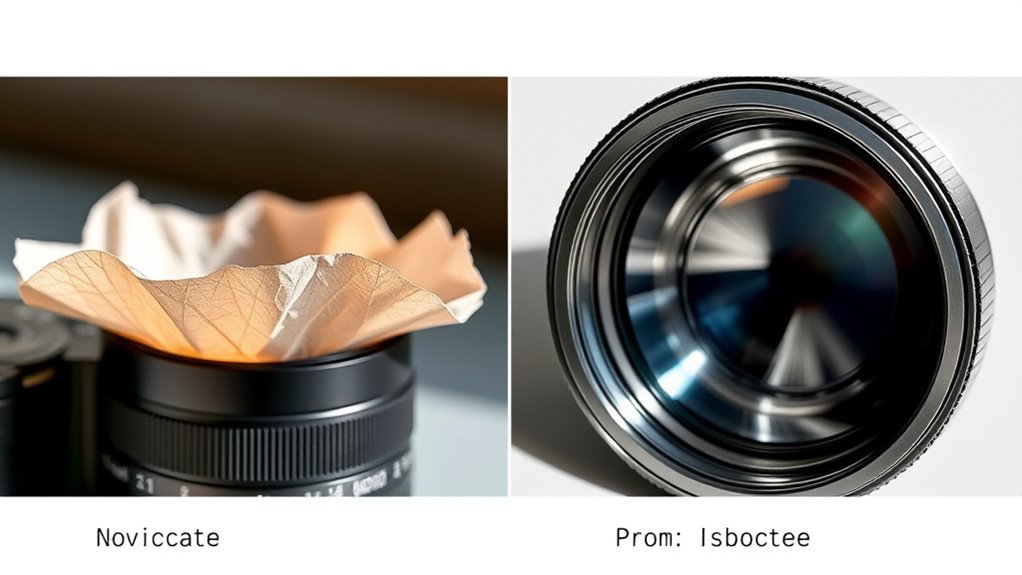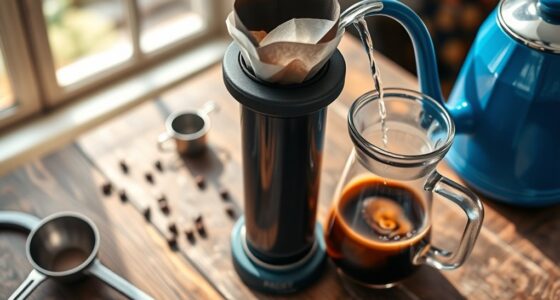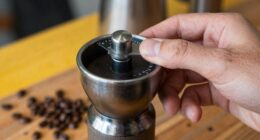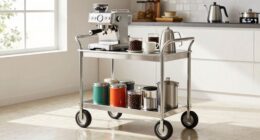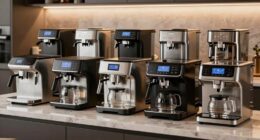To master paper versus metal coffee filters in 7 days, start by understanding their differences in flavor, durability, and maintenance. Paper filters deliver a cleaner, brighter cup by trapping oils and fine particles, while metal filters provide a fuller, bolder taste by passing oils through. Learning how each impacts your brew, along with tips for shifting and combining them, helps you elevate your coffee game quickly. Keep exploring, and you’ll open even more brewing secrets.
Key Takeaways
- Understand the impact of filter types on flavor, extraction, and brew time to choose the right option.
- Learn maintenance techniques to extend the lifespan of paper and metal filters effectively.
- Recognize flavor profile differences—brighter and cleaner with paper, fuller and bolder with metal.
- Practice brewing adjustments when transitioning between filters, including grind size and extraction time.
- Explore combining filters or tweaking parameters for optimal flavor and clarity in your coffee.
Understanding the Basics of Coffee Filters

Coffee filters serve as a crucial barrier that separates the grounds from your brewed coffee, ensuring a clean cup free of sediment. The type of filter you choose influences the extraction process, especially when considering grind size and brew time. A medium grind works well with paper filters, allowing water to pass through efficiently and producing a balanced flavor. If your grind is too fine, brew time increases, risking over-extraction and bitterness. Conversely, a coarse grind shortens brew time but might lead to weak coffee. Metal filters, with their larger pores, accommodate a wider range of grind sizes and typically result in a faster brew. Understanding how grind size impacts brew time helps you control the strength and clarity of your coffee, whether using paper or metal filters.
Exploring the Benefits of Paper Filters
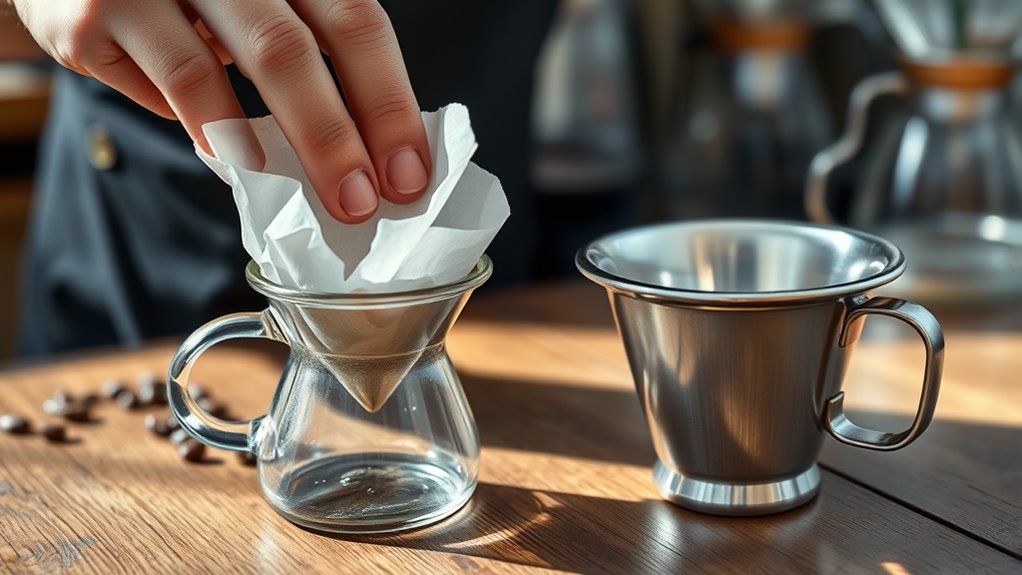
Using paper filters can give you a cleaner cup by trapping most of the oils and fine particles. They also make cleanup quick and simple, so you spend less time on maintenance. If you want an effortless brewing experience, paper filters are a smart choice. Additionally, paper filters can help enhance flavor clarity by removing impurities that might dull the taste.
Clean Cup Experience
Because paper filters trap most oils and fine particles, they help deliver a cleaner, brighter cup. This results in a smoother flavor and enhances the overall drinking experience. The filter aesthetics also play a role, offering a neat, disposable option that many find appealing. Additionally, paper filters have a lighter environmental impact since they are biodegradable and easy to dispose of. To better understand, consider this comparison:
| Aspect | Paper Filters | Metal Filters |
|---|---|---|
| Filter Aesthetics | Clean, minimalist, disposable | Reusable, sturdy |
| Oil Retention | High, results in cleaner taste | Low, can produce richer oils |
| Environmental Impact | Biodegradable, eco-friendly | Reusable, less waste |
| Flavor Clarity | Bright, crisp | Fuller, more complex |
| Maintenance | Easy, no cleaning required | Requires cleaning |
In addition, understanding the filter technology can help you select the best option for your preferences.
Easy Maintenance
One of the key advantages of paper filters is their effortless maintenance. You simply need to replace the filter after each use, which makes your cleaning schedules straightforward. Unlike metal filters, paper filters don’t require scrubbing or deep cleaning—just discard the used filter and insert a fresh one. This saves you time and effort, ensuring your brewing process stays efficient. Additionally, paper filters help prevent buildup of oils and residues that can clog metal filters over time. Since they’re disposable, you avoid the hassle of cleaning stubborn stains or residues. Moreover, paper filters are generally more hygienic since they are discarded after each use, reducing the risk of bacterial growth. Overall, paper filters offer a hassle-free solution, making maintenance quick and easy, so you can focus more on enjoying your coffee and less on cleaning chores.
Uncovering the Advantages of Metal Filters
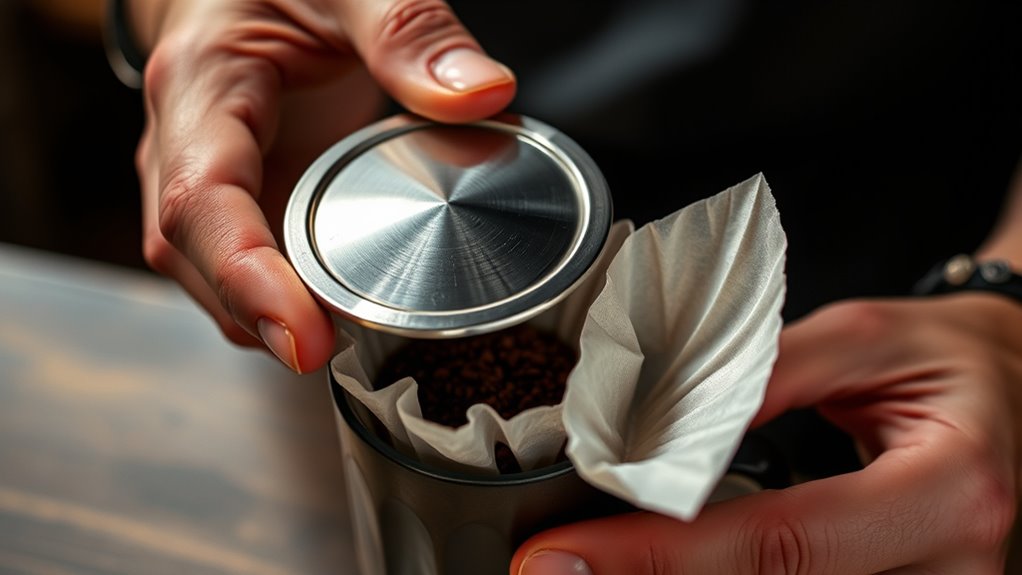
Metal filters are built to last, so you won’t need to replace them as often, saving you money over time. They also help preserve the full flavor of your brew, giving you a richer tasting experience. With these advantages, metal filters are a smart choice for everyday use. Additionally, they can maintain the integrity of the brew by allowing beneficial ingredients like collagen and hyaluronic acid to pass through, enhancing the overall quality of your skincare routine.
Enhanced Durability and Longevity
While paper filters may need frequent replacements, metal filters stand out for their exceptional durability and long-lasting performance. The filter material in metal filters is sturdy and resistant to wear, making them ideal for repeated use. Unlike paper filters, which degrade over time, metal filters maintain their integrity and filtering efficiency, extending their filter lifespan considerably. You won’t need to replace them after every brew, saving you money and reducing waste. Their robustness means they can withstand high temperatures and frequent cleaning without damage. This durability ensures consistent performance over months or even years, making metal filters a reliable choice for both home and professional use. Investing in a metal filter means you get a resilient, eco-friendly option that outlasts traditional paper filters easily. Additionally, metal filters often feature proper storage methods that help maintain their quality over time.
Superior Flavor Preservation
Because of their fine, consistent mesh, metal filters excel at preserving the natural flavors of your coffee. Unlike paper filters, they don’t absorb or strip away essential oils and subtle aromatics, allowing the true taste to shine through. This results in a richer, more complex flavor profile with each brew. While metal filters often have higher filter material costs initially, their durability makes them a cost-effective choice over time. Additionally, they have a lower environmental impact since you can reuse them indefinitely, reducing waste. By choosing a metal filter, you’re not only enhancing your coffee’s flavor but also making a more sustainable decision. The preservation of delicate nuances is what sets metal filters apart, making each cup a more authentic and satisfying experience. Durability of metal filters ensures long-term use and consistent performance.
Comparing the Flavor Profiles: Paper Vs Metal
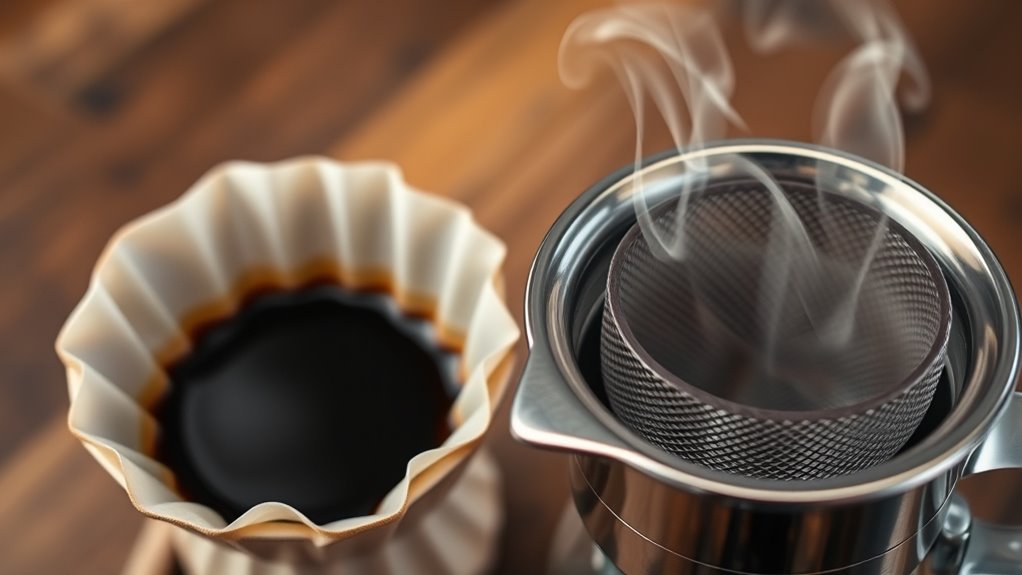
When comparing the flavor profiles of paper and metal filters, you’ll notice distinct differences that can influence the overall taste of your brew. Paper filters tend to produce a cleaner, brighter flavor by trapping oils and fine particles, resulting in less body and a smoother cup. Their filter material absorbs some of the oils that carry rich flavors, leading to a more delicate taste. Metal filters, on the other hand, allow more oils and fine particles through, enhancing flavor extraction and creating a fuller, bolder profile. This can introduce subtle notes and complexity, but may also add a slight metallic or earthy undertone if not cleaned properly. Additionally, the choice of filter can impact the flavor extraction process, highlighting the importance of selecting the right filter for your preferred taste. Ultimately, your choice affects how the flavor is expressed, shaping your coffee experience based on the filter material’s impact on flavor extraction.
Maintenance and Longevity of Different Filters

Maintaining your filters properly guarantees they last longer and perform at their best. Regular cleaning prevents filter degradation and reduces the need for frequent filter replacement. For paper filters, replace them after about 15-30 brews, as they degrade quickly and impact flavor. Metal filters, however, can last years with proper care, but require periodic cleaning to prevent buildup. To understand the importance of maintenance, consider this table:
| Filter Type | Common Maintenance | Estimated Longevity |
|---|---|---|
| Paper | Replace after use | 15-30 brews |
| Metal | Regular cleaning | 1-3 years |
| Both | Avoid deep residues | N/A |
Proper care minimizes filter degradation and extends lifespan, saving you money and ensuring consistent quality. Regularly inspecting your filters for damage or buildup can also help maintain optimal performance.
Making the Switch: Tips for Transitioning Between Filters
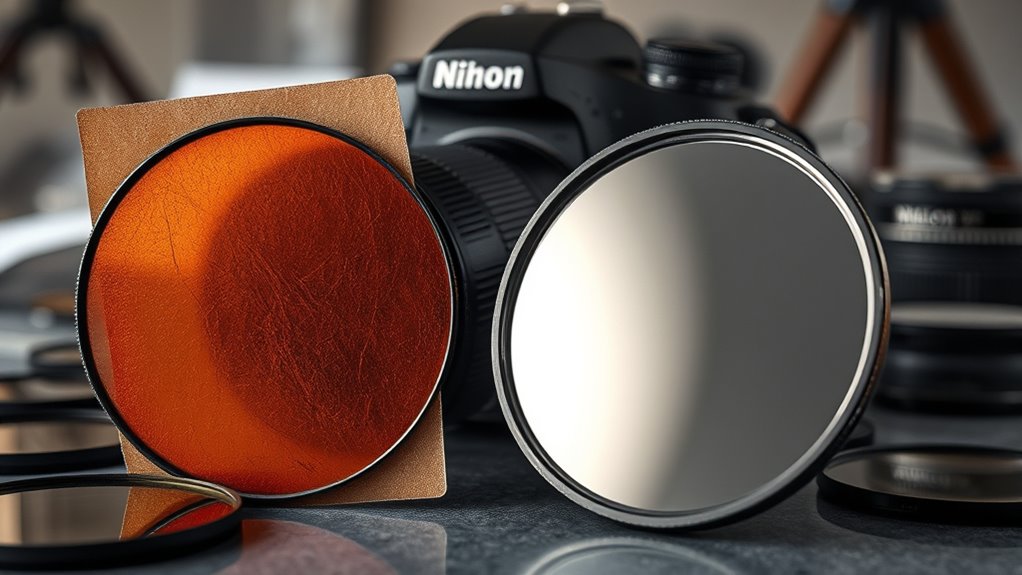
Switching between paper and metal filters can enhance your brewing experience, but it requires some adjustments to guarantee a smooth changeover. First, check filter compatibility with your coffee maker to avoid fitting issues. When shifting, be aware that brewing techniques may need tweaking; for example, metal filters typically allow more oils, influencing extraction times. To adapt, start by experimenting with grind size—coarser for metal, finer for paper—to optimize flow and flavor. Keep in mind that brewing time and water temperature might also require minor adjustments. Practice patience as you get used to the new filter’s characteristics. Additionally, exploring remote hackathons can provide opportunities to learn new brewing techniques or troubleshoot issues with a wider community. By understanding these differences, you’ll ensure consistent results and enjoy the unique qualities each filter type offers.
Perfecting Your Brew: Combining Filters for Optimal Results
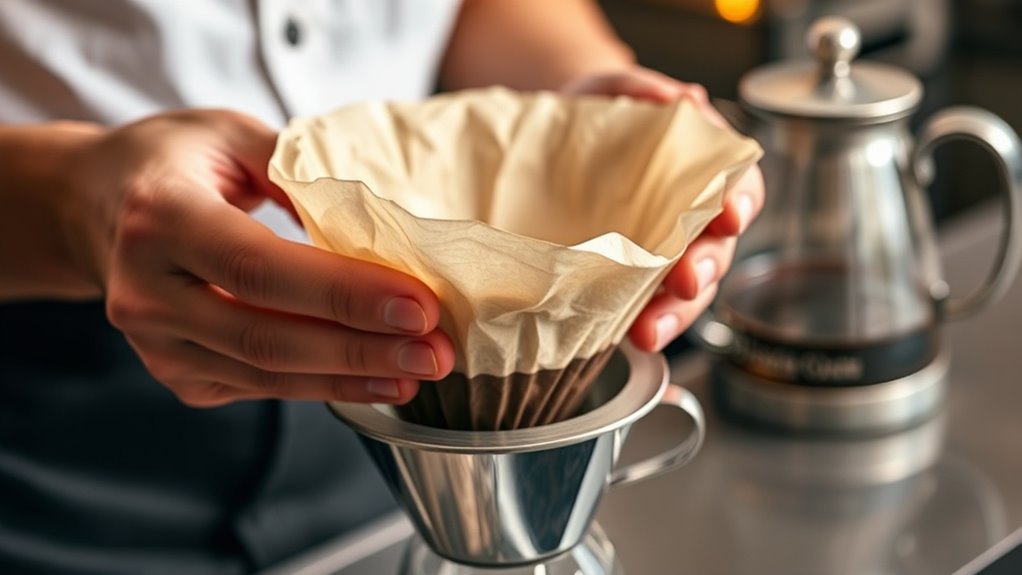
Combining paper and metal filters can elevate your brewing by balancing clarity and body in your coffee. By experimenting with filter layering, you control how much sediment and oils pass through, influencing flavor and texture. Start with a metal filter for richer body, then add a paper filter to clarify the brew. Adjust your brew temperature to optimize extraction, ensuring neither under- nor over-extraction. This method allows you to fine-tune your coffee’s profile to your preference. Utilizing apps or journals can help track your brewing adjustments and preferences for consistent results.
Frequently Asked Questions
Are Metal Filters Suitable for All Types of Coffee Beans?
Metal filters are suitable for most coffee beans, but your choice depends on your flavor preferences. They allow more oils and fine particles through, enhancing coffee bean flavor with a richer taste. Plus, their filter durability means you can reuse them many times without worry. However, if you prefer a cleaner cup with fewer sediments, paper filters might be better. Ultimately, try both to see which suits your taste and brewing style best.
How Do Filter Materials Affect Brewing Temperature Consistency?
Filter materials profoundly impact brewing temperature stability due to their thermal properties. Metal filters, with high thermal conductivity, help maintain consistent brewing temperatures, preventing rapid heat loss. Conversely, paper filters insulate better, which can lead to slight temperature fluctuations. Your choice of filter material influences how well your brew stays at the ideal temperature, ultimately affecting flavor extraction and overall coffee quality.
Can Metal Filters Cause Sediment in the Final Coffee?
Think of metal filters as gateways—durable, but sometimes letting tiny particles slip through, causing sediment buildup in your coffee. Yes, metal filters can cause sediment in the final brew, especially if they age or develop holes. This affects filter longevity and can alter taste. To keep your coffee clean and flavorful, regularly inspect and replace your metal filter, ensuring it remains a reliable barrier and symbol of quality in your brewing journey.
Are There Health Concerns With Using Metal Filters Long-Term?
Using metal filters long-term generally poses minimal health risks, and they’re considered safe for daily use. However, over time, metal filters can corrode or develop rust if not properly maintained, which could affect long-term safety. To guarantee long-term safety, you should clean your metal filter regularly and opt for high-quality materials like stainless steel to reduce any potential health concerns. Proper care keeps your coffee safe and enjoyable.
What Are the Environmental Impacts of Disposing of Paper Filters?
Disposing of paper filters might seem straightforward, but it’s more complex than it appears. Their biodegradability comparison varies depending on materials used, and some can take months to break down. Recycling challenges also arise since coffee oils and residues contaminate them, making eco-friendly disposal difficult. So, while paper filters are convenient, you should consider their environmental impact, especially if you’re aiming to reduce waste and support sustainability efforts.
Conclusion
Now that you’ve explored both paper and metal filters, you’re armed with the knowledge to choose what’s best for your brew. Remember, the perfect cup often lies in the details, so don’t be afraid to experiment and find your sweet spot. Whether you stick with tradition or venture into new territory, the key is to enjoy the journey—because in coffee, as in life, a little exploration goes a long way.
